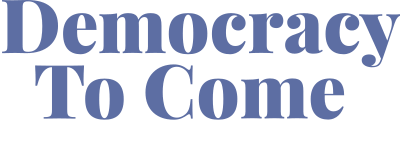March 1st – 3rd 2019, Jubilee Conference Centre, Nottingham University
The purpose of the “Sociocracy at Work” event was to reflect and integrate the findings of a three year ESRC project: “A Democracy to Come? Investigating Change in Alternative Organizations”. The idea was to bring together 50 individuals who are committed to change in alternative organizations, albeit from different perspectives, and explore how they might collectively approach real-world issues in democratic workplaces. Invitations to the event included the members of democratic workplaces themselves (20 people) along with academics committed to democratisation of the workplace (14) and coaches, consultants who transform organizations to more democratic ways of organizing (16). I quickly discovered through the grant that whilst we use this catch all term “workplace democracy”, there is such a wide range of what counts as a democratic organization. This includes, for example, co-operatives using consensus based decision making, or co-ops using majority based decision making, employee owned organizations electing board members, holacratic organizations ceding power to a constitution and even employee voice (at the less engaged or democratic end of the spectrum). I decided within the study to focus on a currently underexplored area of workplace democracy called sociocracy.
Sociocracy is a method of democratic organizational governance that centres around three core notions. Firstly, equivalence of voice as practised within sociocracy is an effort to structure decision making so that all members of the organization have equal chance to be heard and considered. Secondly, equivalence of voice is achieved by asking organizational members to consent to decisions in circles rather than by relying on management hierarchy to make decisions for us. Thirdly, a central feature of sociocracy is its commitment to an inclusive environment through using features such as Non-Violent Communication. NVC asks organizational members to evaluate their own feelings and understandings of an issue to discover their underlying needs. The intended consequence of sociocracy is that it enables the group to carry out compassionate and inclusive governance within the organization by providing equal voice, feedback and respects everybody’s needs and emotional requirements. There are manuals on how to use it – and it is being implemented in organizations around the world – but there are no in depth academic studies incorporating critical evaluations of it in practice.
The two day event involved a deep dive examination of workplaces that are currently immersed in the process of adopting sociocracy. We began by interviewing a dozen or so workers within the organizations (Outlandish, Green City, Unicorn, Technical University of Denmark, Equal Care, Social Care Network). Whilst these are all inspiring and successful organizations the interviews revealed persistent issues or problems that exist within the organization in regard to the adoption and integration of sociocracy.

We had two core aims with the event. Firstly, to learn about and explore creative solutions or alternative understandings of the issues the organizations face. How, for instance, a sociocratic organization might recruit by way of consent within circles or set pay fairly and transparently or ensure that less powerful individuals have a voice, and continue to do so. Secondly, to provide an opportunity to explore, in practice, how academics, practitioners and consultants can work together and learn from this process. Ultimately (through trial and error) our intention with this first event was to begin to create an adaptable and evolving critical intervention method that works in an ongoing fashion to enable organizations to be more democratic.
The event itself (“Sociocracy at Work”) took place on the 1st and 2nd March with a training workshop on the 3rd March providing an introduction/advanced information about sociocracy. It was organized by Prof. Daniel King and I working in our capacity as operational leaders of the Healthy Power Alliance (HPA) – an alliance between academics, practitioners and coaches all interested in extending democracy at work. And the operational leaders of Sociocracy For All – Ted Rau and Jerry Koch-Gonzalez – an international network providing training, consultancy and resources for individuals and organizations. Other members of the planning committee included Nathaniel Whitestone, Michelle Smith, Tracy Kunkler, Pete Burden and Graham Boyd, all of whom provided expert facilitation and design features in an effort to make the most of the collective wisdom on offer and allow these different groups to work together effectively.

The general flow and aim of the event was as follows:
- Based on interviews with members six of the aforementioned sociocratic organizations had briefings circulated about the issues which they are facing within their adoption of sociocracy. In the event they presented an operational issue that they wanted to explore which was disrupting their democratic practice.
- We then used a variety of radical organizational methods to conduct a collective deep dive into the issues faced by the organizations. We then worked to offer potential solutions based on our experiences and theoretical understandings.
- At the end of the event we brought together the key themes that had arisen over the two days and provided a space for reflection. Quite importantly, this was a space for an experiment around workplace democracy implementation. How these diverse individuals and groups can work together collectively so that academics, practitioners and consultants can collaborate with positive results.
- At the end of the event we had a range of suggestions for the organizations to take back to their workplace circles so that they could start to confront the issues on the ground. There was a clear pathway for each organization to develop a critical intervention and change to improve democracy at work within the organizations.
- We planned to return to the organization in six months to conduct interview(s) to see how successful the interventions and implementation had been.
We saw this event as our first real effort to develop a critical method of intervention in democratic practice and show that our academic discipline (Critical Management Studies [CMS]) can successfully intervene and contribute to the development of democratic working. We (rather grandiosely!) hope this can be the beginning of a movement in which we as a group committed to democracy at work collaborate to extend it to as many workplaces as possible and spread fairness and justice at work. This involves a commitment to expand democracy at work but to work and explore how it can work more effectively so that over time it becomes the most attractive form of governance within organizations.

The event itself was successful insofar that it provided a range of practical outcomes for the organizations involved. We will explore these in future planned outputs (including, fingers crossed, a monograph) and I shall, to some degree, whilst protecting anonymity in future blog posts. However, more immediately for this project, the event was an invaluable insight in to how we can collectively work together to explore issues around implementation in democratic organizations. Daniel and I have conducted post-event interviews with participants to explore the difficulties that arose between academics, consultants and members in trying to work with each other towards collective solutions. Many of the common difficulties of academics working with practitioners arose (occupying different worlds etc) but more interestingly many more solutions were found or proposed that we can carry on to events two and three that are planned for later in 2019. One of the most persistent issues we need to face if we are to work together is to understand how we approach issues of democratisation with different perspectives and priorities but most importantly understand overarching principles that connect us all – we are bound by our common desire for justice and fairness and equity in the workplace and this, we hope, will eventually enable us to work more effectively together.
Here are a few more photos from the event!


















